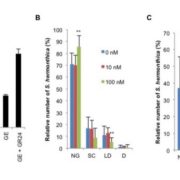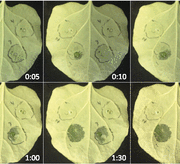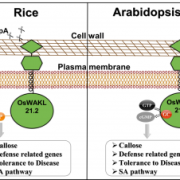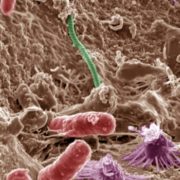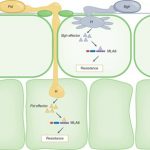Arabidopsis CHROMATIN REMODELING 19 acts as a transcriptional repressor and contributes to plant pathogen resistance (Plant Cell)
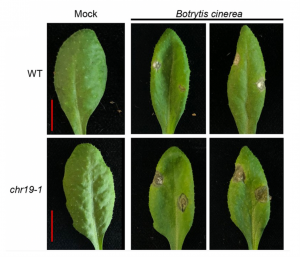 Chromatin remodellers are highly conserved eukaryotic proteins with regulatory roles in various aspects of DNA metabolism including DNA repair, gene expression and mitosis. Here, Kang et al. examine the function of the CHROMATIN REMODELLING19 (CHR19) in Arabidopsis thaliana. Using two T-DNA insertion lines, the researchers first showed that unlike its animal and yeast homologues, CHR19 does not appear to function in DNA repair, with chr19 displaying equal tolerance to DNA damaging agents as wild type plants. RNA-sequencing revealed that a large number of genes are upregulated in the chr19-1 mutant, with genes involved in the salicylic acid and jasmonic acid defence pathways being particularly enriched. To further probe this role of CHR19, the group challenged chr19 plants with bacterial and fungal pathogens. Interestingly the chr19 lines were equally susceptible to the hemibiotrophic bacteria Pseudomonas syringae, but significantly more susceptible to the fungal necrotroph Botrytis cinerea. Finally, the researchers showed that treatment with exogenous salicylic acid reduces the transcript levels of CHR19, and reduces the enrichment of CHR19 at the genomic regions encoding the salicylic acid responsive genes PR1 and WRKY70. Jasmonic acid did not have this effect on CHR19 expression, suggesting that rather than acting as a global suppressor of defence gene expression, CHR19 acts to fine tune specific aspects of plant immunity. (Summary by Rory Burke @rorby95) Plant Cell 10.1093/plcell/koab318
Chromatin remodellers are highly conserved eukaryotic proteins with regulatory roles in various aspects of DNA metabolism including DNA repair, gene expression and mitosis. Here, Kang et al. examine the function of the CHROMATIN REMODELLING19 (CHR19) in Arabidopsis thaliana. Using two T-DNA insertion lines, the researchers first showed that unlike its animal and yeast homologues, CHR19 does not appear to function in DNA repair, with chr19 displaying equal tolerance to DNA damaging agents as wild type plants. RNA-sequencing revealed that a large number of genes are upregulated in the chr19-1 mutant, with genes involved in the salicylic acid and jasmonic acid defence pathways being particularly enriched. To further probe this role of CHR19, the group challenged chr19 plants with bacterial and fungal pathogens. Interestingly the chr19 lines were equally susceptible to the hemibiotrophic bacteria Pseudomonas syringae, but significantly more susceptible to the fungal necrotroph Botrytis cinerea. Finally, the researchers showed that treatment with exogenous salicylic acid reduces the transcript levels of CHR19, and reduces the enrichment of CHR19 at the genomic regions encoding the salicylic acid responsive genes PR1 and WRKY70. Jasmonic acid did not have this effect on CHR19 expression, suggesting that rather than acting as a global suppressor of defence gene expression, CHR19 acts to fine tune specific aspects of plant immunity. (Summary by Rory Burke @rorby95) Plant Cell 10.1093/plcell/koab318


